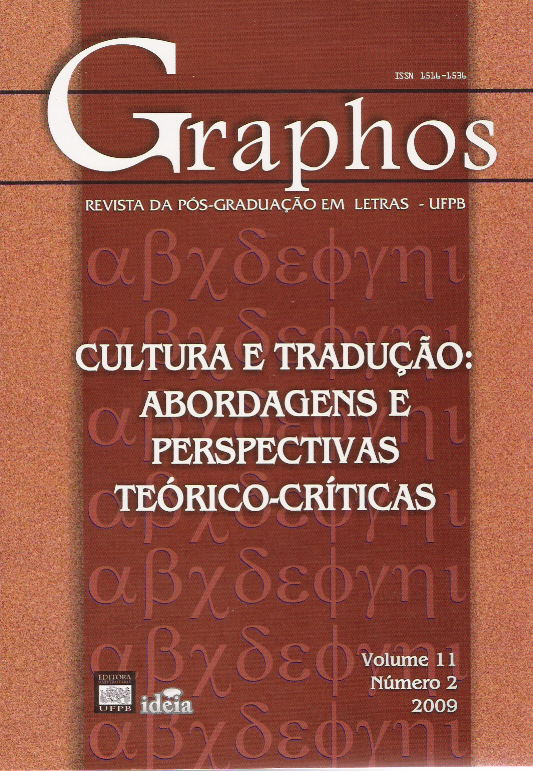Constructing contemporary art and culture: an analysis considering Zeca Baleiro’s work
Keywords:
medieval poetry, female troubadours, ballad, wife’s complaintAbstract
MPB (Brazilian Popular Music) is deeply rooted within its specific environment and time. MPB retains the marks of the transformations undergone by its society, and has recreated such transformations into peculiar aesthetical forms of artistic expression. Deriving from worldwide spread international music genres, MPB establishes a good dialogue with globalized movements, while creating its own identity within the gaps. From the Nineties onwards, MPB artists hold a means of artistic creation and a kind of authorship well inserted into this new world context where the frontiers have been erased and identities have been blended. Their music travels through different places and genres, recycling and translating the places they come from, with their usages and traditions, in a way inserting these places within a globalized culture, giving them a cosmopolitan scope, without ever losing their peculiar means of expression. Therefore, the focus of the study is the musical production of the 1990’s, and, especially, the aim of this paper is to analyse the creative work of Zeca Baleiro. KEY WORDS: Brazilian Popular Music; Cultural translation; Hybridity; Cultural Recycling; Zeca Baleiro.
Downloads
References
AGUIRREA, J. & INEILLO, Humphrey. “Divididos – Agradecer y seguir.” La García, año 1, n.28, abril 2000, Buenos Aires, p.14-25.
BALEIRO, Zeca. Por onde andará Stephen Fry? São Paulo: MZA Music / PolyGram, 1997.
BALEIRO, Zeca. Vô imbolá. São Paulo: MZA Music / PolyGram, 1999.
BUARQUE DE HOLLANDA, Heloísa. “Políticas da produção de conhecimento em tempos globalizados”. In: MIRANDA, Wander Melo (org.). Narrativas da Modernidade. Belo Horizonte: Autêntica, 1999. p. 345-356.
DIVIDIDOS. Edición Especial. El Biombo, Buenos Aires, ano 1, n.1., 2001.
GARCÍA CANCLINI, Néstor. Culturas híbridas: estrategias para entrar y salir de la modernidad. México: Consejo Nacional para la cultura y las Artes, Grijalbo, 1990.
GARCÍA CANCLINI, Néstor. “El debate sobre la hibridación.” Revista de Crítica Cultural, n.15, nov.1997, Santiago do Chile.
GARCÍA CANCLINI, Néstor. La globalización imaginada. Buenos Aires, Barcelona, México: Paidós, 1999.
GARCÍA CANCLINI, Néstor. “Hibridação.” In: ALTAMIRANDO, Carlos (org.). Términos críticos de Sociología de la Cultura. Buenos Aires: Paidós, 2002. p. 123-126.
HUYSSEN, Andreas. Seduzidos pela memória: arquitetura, monumentos, mídia. Rio de Janeiro: Aeroplano, 2000.
MARTÍN-BARBERO, Jesús. Dos meios às mediações: comunicação, cultura e hegemonia. Rio de Janeiro: Editora UFRJ, 1997.
MOSER, Walter. “La recyclage culturel.” In: DIONNE, C., MARINELLO, S., MOSES, W. (org.). Recyclages: economies de l’apropriation culturelle. Montreal: Éditions Balzac, 1996.
NERCOLINI, Marildo José. A construção cultural pelas metáforas: A MPB e o Rock Nacional Argentino repensam as fronteiras globalizadas. Rio de Janeiro: UFRJ/ LETRAS, 2005. (Tese defendida no Programa de Ciência da Literatura.) POLLAK, Michael. “Memória, esquecimento e silêncio”. In: Estudos Históricos, Rio de Janeiro, vol. 2, n. 3, 1989, p. 3-15. Disponível em: http://www.cpdoc.fgv.br/revista/arq/43.pdf SAID, Edward. “Traveling Theories”. In: ___________. The World, the Text, and the Critic. Cambridge: Harvard University Press, 1983.
WILLIAMS, Raymond. Cultura. 2ª ed. Rio de Janeiro: Paz e Terra, 2000.







